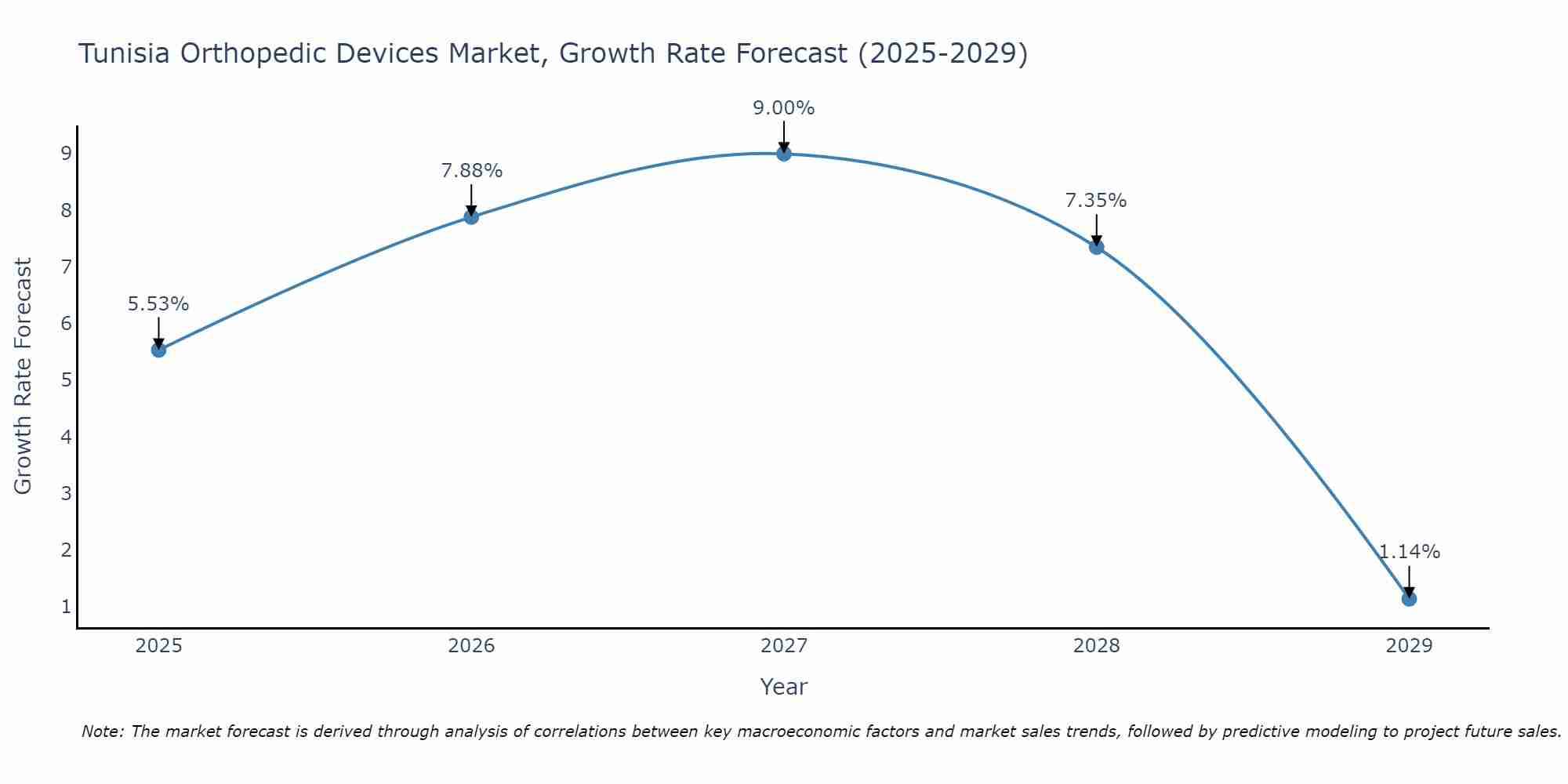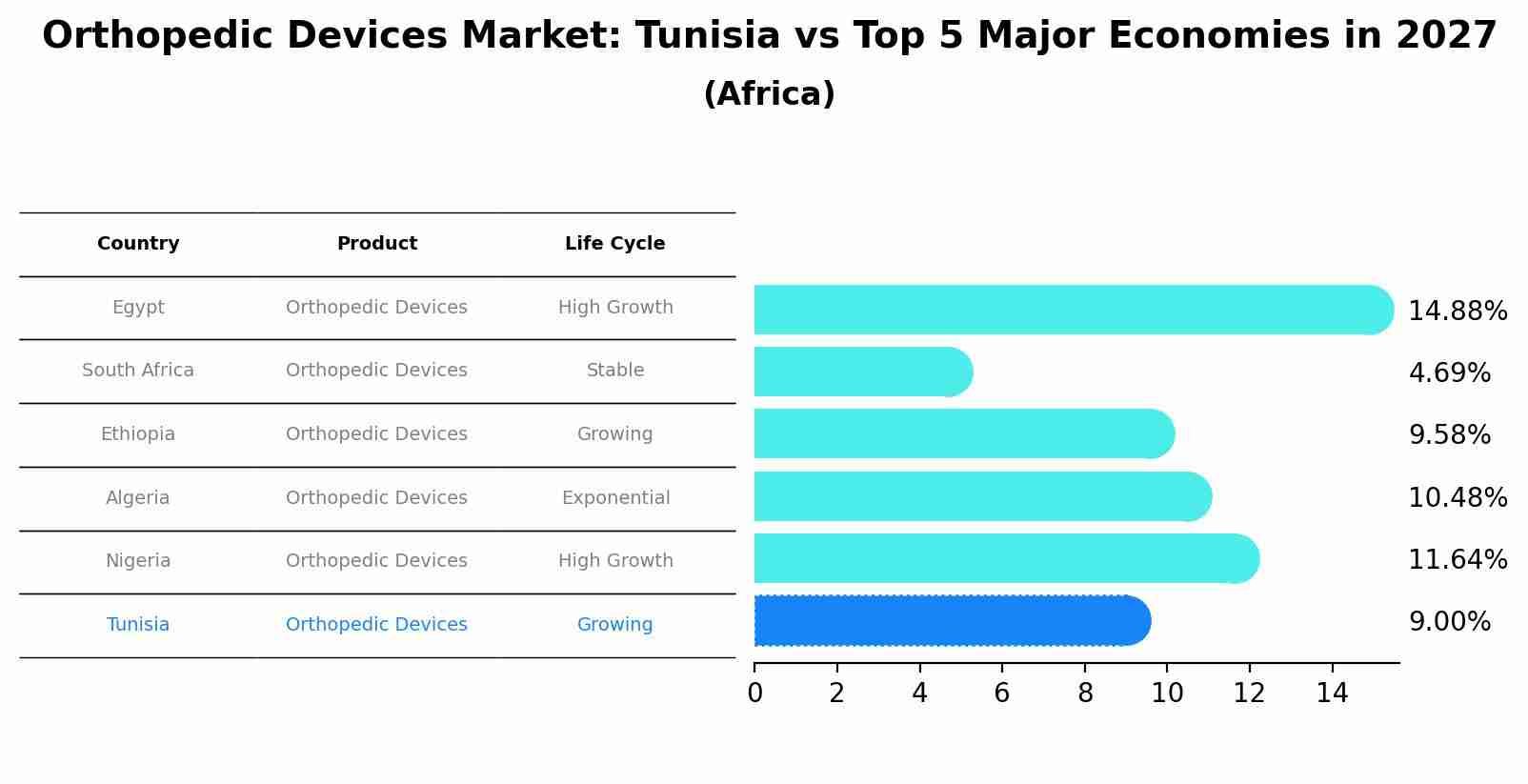Tunisia Orthopedic Devices Market Outlook | Share, Analysis, COVID-19 IMPACT, Forecast, Value, Companies, Size, Revenue, Trends, Growth & Industry
| Product Code: ETC368154 | Publication Date: Aug 2022 | Updated Date: Jul 2025 | Product Type: Market Research Report | |
| Publisher: 6Wresearch | Author: Sachin Kumar Rai | No. of Pages: 75 | No. of Figures: 35 | No. of Tables: 20 |
Tunisia Orthopedic Devices Market Size Growth Rate
The Tunisia Orthopedic Devices Market is projected to witness mixed growth rate patterns during 2025 to 2029. The growth rate begins at 5.53% in 2025, climbs to a high of 9.00% in 2027, and moderates to 1.14% by 2029.

Orthopedic Devices Market: Tunisia vs Top 5 Major Economies in 2027 (Africa)
By 2027, Tunisia's Orthopedic Devices market is forecasted to achieve a growing growth rate of 9.00%, with Egypt leading the Africa region, followed by South Africa, Ethiopia, Algeria and Nigeria.

Tunisia Orthopedic Devices Market Synopsis
The Tunisia Orthopedic Devices Market is experiencing steady growth driven by factors such as an increasing elderly population, rising incidence of orthopedic disorders, and improving healthcare infrastructure. The market encompasses a wide range of products including joint reconstruction devices, spinal devices, trauma fixation devices, orthobiologics, and orthopedic accessories. Key players in the market are focusing on introducing innovative technologies, such as 3D printing and minimally invasive surgical techniques, to enhance patient outcomes. The market is also witnessing a trend towards personalized orthopedic solutions to cater to individual patient needs. Government initiatives to improve healthcare access and affordability, along with a growing awareness of the benefits of orthopedic devices, are further contributing to market growth in Tunisia.
Tunisia Orthopedic Devices Market Trends
The Tunisia Orthopedic Devices Market is experiencing a shift towards more advanced technologies and minimally invasive procedures. There is a growing demand for orthopedic implants and devices that offer better outcomes, faster recovery times, and reduced post-operative complications. Companies are increasingly focusing on developing innovative products such as 3D-printed implants, smart implants with remote monitoring capabilities, and robotic-assisted surgery systems. In addition, there is a rising prevalence of musculoskeletal disorders and an aging population driving the market growth. The market is also witnessing a trend towards personalized orthopedic solutions tailored to individual patient needs. Overall, the Tunisia Orthopedic Devices Market is poised for significant growth in the coming years as technological advancements continue to drive innovation in the industry.
Tunisia Orthopedic Devices Market Challenges
In the Tunisia Orthopedic Devices Market, some of the key challenges include limited access to advanced technology and high-quality orthopedic devices, which hinders the ability of healthcare facilities to provide optimal treatment to patients. Additionally, there are concerns regarding the affordability of orthopedic devices for both healthcare providers and patients, as well as issues related to regulatory hurdles and reimbursement policies. Lack of skilled orthopedic professionals and inadequate infrastructure in certain regions also pose challenges in delivering effective orthopedic care. Overall, addressing these challenges would require collaboration between stakeholders to improve access to quality devices, enhance regulatory frameworks, and invest in training programs to strengthen the orthopedic healthcare system in Tunisia.
Tunisia Orthopedic Devices Market Investment Opportunities
The Tunisia orthopedic devices market presents various investment opportunities due to factors such as an aging population, increasing prevalence of orthopedic conditions, and growing healthcare infrastructure. Investing in companies that manufacture and distribute orthopedic implants, prosthetics, and instruments could be lucrative. Additionally, there is a rising demand for technologically advanced orthopedic devices, creating opportunities for companies focused on innovation in the sector. Collaborating with local healthcare providers and hospitals to supply high-quality orthopedic devices could also be a promising investment strategy. Overall, the Tunisia orthopedic devices market offers potential for growth and profit for investors looking to capitalize on the increasing need for orthopedic solutions in the country.
Jordan Agar Market Government Policies
Government policies in Tunisia related to the orthopedic devices market focus on ensuring the safety, quality, and affordability of medical devices. The Ministry of Health oversees the registration and approval process for orthopedic devices to ensure compliance with national and international standards. Import regulations require companies to obtain licenses and adhere to specific labeling and packaging requirements. Additionally, the government provides subsidies and financial support to enhance access to orthopedic devices for patients in need. The regulatory framework aims to promote innovation, competition, and transparency in the market while safeguarding public health and consumer interests. Overall, government policies in Tunisia aim to create a conducive environment for the growth and development of the orthopedic devices market while prioritizing patient safety and healthcare quality.
Tunisia Orthopedic Devices Market Future Outlook
The Tunisia Orthopedic Devices Market is poised for steady growth in the coming years due to several factors, including an aging population, increasing incidence of orthopedic disorders, and rising awareness about advanced treatment options. Technological advancements in orthopedic devices, such as implants and prosthetics, are expected to drive market growth further. Additionally, the government`s focus on improving healthcare infrastructure and increasing investments in the healthcare sector will contribute to the expansion of the orthopedic devices market in Tunisia. However, factors such as stringent regulatory requirements and pricing pressures may pose challenges for market players. Overall, the Tunisia Orthopedic Devices Market is projected to experience sustained growth in the foreseeable future, presenting opportunities for both domestic and international orthopedic device manufacturers.
Key Highlights of the Report:
- Tunisia Orthopedic Devices Market Outlook
- Market Size of Tunisia Orthopedic Devices Market, 2021
- Forecast of Tunisia Orthopedic Devices Market, 2031
- Historical Data and Forecast of Tunisia Orthopedic Devices Revenues & Volume for the Period 2018 - 2031
- Tunisia Orthopedic Devices Market Trend Evolution
- Tunisia Orthopedic Devices Market Drivers and Challenges
- Tunisia Orthopedic Devices Price Trends
- Tunisia Orthopedic Devices Porter's Five Forces
- Tunisia Orthopedic Devices Industry Life Cycle
- Historical Data and Forecast of Tunisia Orthopedic Devices Market Revenues & Volume By Application for the Period 2018 - 2031
- Historical Data and Forecast of Tunisia Orthopedic Devices Market Revenues & Volume By Hip Orthopedic Devices for the Period 2018 - 2031
- Historical Data and Forecast of Tunisia Orthopedic Devices Market Revenues & Volume By Knee Orthopedic Devices for the Period 2018 - 2031
- Historical Data and Forecast of Tunisia Orthopedic Devices Market Revenues & Volume By Spine Orthopedic Devices for the Period 2018 - 2031
- Historical Data and Forecast of Tunisia Orthopedic Devices Market Revenues & Volume By Craniomaxillofacial Orthopedic Devices for the Period 2018 - 2031
- Historical Data and Forecast of Tunisia Orthopedic Devices Market Revenues & Volume By Dental Orthopedic Devices for the Period 2018 - 2031
- Historical Data and Forecast of Tunisia Orthopedic Devices Market Revenues & Volume By Sports Injuries, Extremities And Trauma (Set) Orthopedic Devices for the Period 2018 - 2031
- Historical Data and Forecast of Tunisia Orthopedic Devices Market Revenues & Volume By Product for the Period 2018 - 2031
- Historical Data and Forecast of Tunisia Orthopedic Devices Market Revenues & Volume By Drill Guide for the Period 2018 - 2031
- Historical Data and Forecast of Tunisia Orthopedic Devices Market Revenues & Volume By Guide Tubes for the Period 2018 - 2031
- Historical Data and Forecast of Tunisia Orthopedic Devices Market Revenues & Volume By Implant Holder for the Period 2018 - 2031
- Historical Data and Forecast of Tunisia Orthopedic Devices Market Revenues & Volume By Custom Clamps for the Period 2018 - 2031
- Historical Data and Forecast of Tunisia Orthopedic Devices Market Revenues & Volume By Distracters for the Period 2018 - 2031
- Historical Data and Forecast of Tunisia Orthopedic Devices Market Revenues & Volume By Screw Drivers for the Period 2018 - 2031
- Historical Data and Forecast of Tunisia Orthopedic Devices Market Revenues & Volume By Accessories for the Period 2018 - 2031
- Tunisia Orthopedic Devices Import Export Trade Statistics
- Market Opportunity Assessment By Application
- Market Opportunity Assessment By Product
- Tunisia Orthopedic Devices Top Companies Market Share
- Tunisia Orthopedic Devices Competitive Benchmarking By Technical and Operational Parameters
- Tunisia Orthopedic Devices Company Profiles
- Tunisia Orthopedic Devices Key Strategic Recommendations
Frequently Asked Questions About the Market Study (FAQs):
- Single User License$ 1,995
- Department License$ 2,400
- Site License$ 3,120
- Global License$ 3,795
Search
Thought Leadership and Analyst Meet
Our Clients
Related Reports
- Afghanistan Apparel Market (2026-2032) | Growth, Outlook, Industry, Segmentation, Forecast, Size, Companies, Trends, Value, Share, Analysis & Revenue
- Canada Oil and Gas Market (2026-2032) | Share, Segmentation, Value, Industry, Trends, Forecast, Analysis, Size & Revenue, Growth, Competitive Landscape, Outlook, Companies
- Germany Breakfast Food Market (2026-2032) | Industry, Share, Growth, Size, Companies, Value, Analysis, Revenue, Trends, Forecast & Outlook
- Australia Briquette Market (2025-2031) | Growth, Size, Revenue, Forecast, Analysis, Trends, Value, Share, Industry & Companies
- Vietnam System Integrator Market (2025-2031) | Size, Companies, Analysis, Industry, Value, Forecast, Growth, Trends, Revenue & Share
- ASEAN and Thailand Brain Health Supplements Market (2025-2031) | Strategy, Consumer Insights, Analysis, Investment Trends, Opportunities, Growth, Size, Share, Industry, Revenue, Segments, Value, Segmentation, Supply, Forecast, Restraints, Outlook, Competition, Drivers, Trends, Demand, Pricing Analysis, Competitive, Strategic Insights, Companies, Challenges
- ASEAN Bearings Market (2025-2031) | Strategy, Consumer Insights, Analysis, Investment Trends, Opportunities, Growth, Size, Share, Industry, Revenue, Segments, Value, Segmentation, Supply, Forecast, Restraints, Outlook, Competition, Drivers, Trends, Demand, Pricing Analysis, Competitive, Strategic Insights, Companies, Challenges
- Europe Flooring Market (2025-2031) | Outlook, Share, Industry, Trends, Forecast, Companies, Revenue, Size, Analysis, Growth & Value
- Saudi Arabia Manlift Market (2025-2031) | Outlook, Size, Growth, Trends, Companies, Industry, Revenue, Value, Share, Forecast & Analysis
- Uganda Excavator, Crane, and Wheel Loaders Market (2025-2031) | Strategy, Consumer Insights, Analysis, Investment Trends, Opportunities, Growth, Size, Share, Industry, Revenue, Segments, Value, Segmentation, Supply, Forecast, Restraints, Outlook, Competition, Drivers, Trends, Demand, Pricing Analysis, Competitive, Strategic Insights, Companies, Challenges
Industry Events and Analyst Meet
Whitepaper
- Middle East & Africa Commercial Security Market Click here to view more.
- Middle East & Africa Fire Safety Systems & Equipment Market Click here to view more.
- GCC Drone Market Click here to view more.
- Middle East Lighting Fixture Market Click here to view more.
- GCC Physical & Perimeter Security Market Click here to view more.
6WResearch In News
- Doha a strategic location for EV manufacturing hub: IPA Qatar
- Demand for luxury TVs surging in the GCC, says Samsung
- Empowering Growth: The Thriving Journey of Bangladesh’s Cable Industry
- Demand for luxury TVs surging in the GCC, says Samsung
- Video call with a traditional healer? Once unthinkable, it’s now common in South Africa
- Intelligent Buildings To Smooth GCC’s Path To Net Zero


















